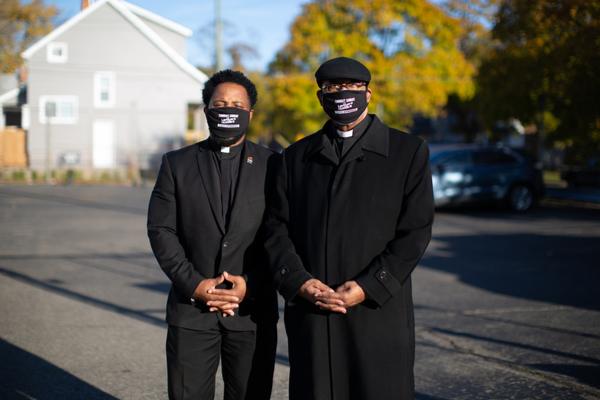Even after Joe Biden was projected as the winner of the 2020 election, Rev. Dr. James C. Perkins of Greater Christ Baptist Church in Detroit continued to watch the news closely.
He and other pastors in the city have spent the better part of the year encouraging their communities to vote. On Nov. 3, many of them donned their collars and went to the polls, not just as voters but as poll chaplains on watch for any signs of violence or voter intimidation. Now, Perkins and other pastors of Black churches in the city want to make sure Detroit’s votes are counted.
Following Election Day, supporters of President Donald Trump chanted “stop the count” at a Detroit center where absentee ballots were being tallied. In several emails over the week that followed, Trump said cities “like Detroit and Philadelphia” should not determine the outcome of the election, singling out two cities with significant African-American populations. On Nov. 10, Trump’s campaign filed a new lawsuit in Michigan federal court alleging that Detroit election officials broke the law while processing ballots. Late last week, a judge rejected the campaign’s request to block Detroit from certifying ballots, but the president continues to call the election “rigged” against him.
“We don’t know whether or not any of his people will come into the city and start anything, but we’re preparing ourselves to be on watch for that [...] and to see if any situation will occur in which we will have to intercede,” Perkins said.
Perkins has remained calm. “The votes are there,” he said. He and other pastors in the city helped make sure they would be. Black communities in Detroit have been disproportionately hit by the coronavirus pandemic and the ongoing threats of police violence, and the pastors did everything they could to make sure those communities were heard in this election.
Black lives, Black votes
In the first few months of the pandemic, African Americans in Michigan made up 40 percent of COVID-19 deaths despite only making up 14 percent of the population, according to state data. In May and June, the city erupted in protest against systemic racism and police brutality after a video showing the killing of George Floyd in police custody was made public.
“My mindset was responding to two pandemics going on at the same time,” said Pastor Keenann R. Knox, senior pastor of Impact Church in Detroit, an approximately 700-member congregation. “The pandemic of COVID-19 and the pandemic of racial stress.”
Like most churches in the city, Impact Church has been broadcasting their services via Facebook Live or YouTube since late-March, when Michigan Gov. Gretchen Whitmer issued a stay-at-home order. Through various online channels, Knox said he preached the importance of safety during the pandemic and the value of Black lives.
Knox said he tried to focus that energy toward the election whenever possible, “translating ‘Black Lives Matter’ to ‘Black Votes Matter.’”
“We can protest, and protesting gets people’s attention,” he said. “But voting commands respect and we need to command the respect of our elected officials.”
“These are the things that we kept hearing over and over again,” said Rev. Charles Williams II, pastor of Detroit’s Historic King Solomon Baptist Church and chair of National Action Network Michigan. “We've gotta get this COVID-19 under control, and we’ve gotta do something about this police brutality.”
Williams said he coordinated with members of the Council of Baptist Pastors of Detroit and Vicinity, the African American Ministers Leadership Council, and the Conference of National Black Churches throughout the election season to make sure every voter could vote safely and without fear of intimidation.
“In 2020 we knew that we could not leave any stone unturned,” Williams said. “We were working to put a full court press around voter education, absentee voting, and voter mobilization and voter protection.”
Sojourners spoke with more than a half dozen pastors in Detroit, with congregations ranging from 100 to 2,000 people. Most of them said they put more work into getting out the vote in 2020 than they had in any previous year. Their efforts included putting pressure on the city clerk’s office to make ballot drop boxes available around the city.
“I’ve been a pastor for 44 years in Detroit in the urban setting. I have never seen this level of organization and mobilization toward an election as I saw this time,” said Bishop Edgar Vann II, senior pastor of Second Ebenezer Church. “This one went deep into the literal souls of people because everything everyone has gone through this year.”
“A lot is at stake”
In early October, the news broke that a group of far-right terrorists had planned to kidnap Whitmer, a Democrat. Meanwhile, voter protection advocates worried about potential violence or voter intimidation at the polls, particularly in swing states and in cities with large populations of people of color — places like Detroit.
During a Zoom meeting later that month, members of the Council of Baptist Pastors of Detroit and Vicinity spoke to Heaster Wheeler, Michigan’s assistant secretary of state about the state’s new absentee voting policies and the best ways to keep voters safe given the pandemic.
One pastor asked if he should be concerned about security at his own church, which would serve as a polling place on Nov. 3, and whether it was a good idea to prepare for possible attacks.
“You’ve got a president who says he is not going peacefully, you’ve got conservatives across this state saying ‘Go to Detroit,’ you’ve got 13 people who have already been arrested for threatening to kidnap and/or kill [Gov. Whitmer],” said Wheeler. “I don’t know how much more serious this moment needs to get.”
“I would be hyper-concerned,” Wheeler advised. “Too much is at stake.”
Rev. Dr. Steve Bland Jr., senior pastor at Liberty Temple Baptist Church and president of the council, reminded the other pastors on the call to encourage early voting among their congregations.
“This is a nonpartisan appeal to get out the vote, but I will tell you this: it’s time for us to do not only a sanitizing of the polling places … but it’s time to help sanitize the White House,” Bland said. “That’s my dog whistle.”
“As goes Detroit, does go Michigan,” he added, repeating a phrase he used throughout the election season.
As religious leaders, pastors are prohibited from directly endorsing candidates for public office. While some pastors have explicitly called Trump a threat to democracy or spoken about the need to support Biden, most Detroit faith leaders steered clear of partisan language.
“People in the city or outsiders think of Detroit pastors as political powerhouses in the tradition of Martin Luther King,” said Khalilah Burt Gaston, who attends The Ark Detroit, a small congregation of approximately 100 members. “And while that is a prototype for the Black pastor, I think currently, Black pastors are more nonpartisan or bipartisan. They don’t want to be seen as swaying their congregations one way or another.”
And yet, there was a clear partisan divide when it came to outreach from the campaigns.
The Biden-Harris campaign made a point to connect with faith communities in Detroit as the election neared. Rev. Williams of King Solomon Baptist said he spoke on numerous occasions with representatives from the Biden campaign, with Kamala Harris herself hosting virtual meetings with Black clergy. Harris, a Black Baptist, spoke at a drive-through service at Triumph Church near Detroit on Oct. 25, and returned to the city for her final campaign events on Election Day.
“There were no conversations with the Trump campaign,” Williams added. “We weren’t invited to any conversations.”
What drove turnout
Michigan was blue for more than two decades until Donald Trump eked out a victory in 2016 on a margin of just over 10,000 votes. Many people have attributed Trump’s victory to low voter turnout in cities like Detroit.
But 2020 was different. Voter turnout in Wayne County, where Detroit is located, went up by 2.5 percentage points from 2016 to 2020. Biden won 68 percent of the county and 94 percent of the city of Detroit. “We feel like we made up what we failed to accomplish in 2016,” Perkins said.
To be sure, efforts to get out the vote in Detroit weren’t just coming from the city’s pastors.
Pastor Boyd White, a pastor at The Ark Detroit, is skeptical that pastor-led voting initiatives made the difference in the election.
“I think that there was such a passionate aversion to Donald Trump and what he’s been doing over the past four years that it fueled everybody,” White said. “Black people are going to vote because we’re pissed off.”
Boyd believes the election was more likely decided by young voters who became politically active following the murder of George Floyd and protested against police brutality. “This was a situation where the swell was so great around us, we didn’t have to do a lot,” he said of the church’s role.
“I think churches, yes, have been a part of it, but I also think it’s broader than church,” said Khalilah Burt Gaston, a member of White’s congregation, who noted that block clubs, historically Black fraternities and sororities, and other Detroit volunteer organizations also mobilized to encourage mail-in and early voting in 2020. “The effort to make people aware of the process for absentee ballots was a top to bottom strategy,” she said.
Dr. Nichole R. Phillips, sociologist of religion and director of Black church studies at Emory’s Candler School of Theology, said it would be wrong to understand the church as the only motivating factor for voters of faith. Nonetheless, she said, the Black church remains a powerful force in the community.
“Is the church the only institution that has addressed voter suppression? No,” Phillips said. “But the church does build coalitions with outside institutions and has been doing it way before Nov. 3 and definitely before this very active and intense political season.”
What comes next
By the time Election Day arrived, nearly half a million residents of Wayne County had already voted.
Perkins, Bland, and more than 100 other pastors across Detroit served as poll chaplains through an initiative led by Lawyers & Collars/Turnout Sunday (Lawyers & Collars is an initiative of Sojourners and the National African American Clergy Network). Bland said he had served as a poll chaplain before, but that he had never participated in an initiative of such magnitude. He and other pastors were prepared for the possibility of widespread voter suppression. “It felt like we were in Alabama or some southern state.”
Luckily, chaplains reported only a few minor incidents on Election Day.
Asked whether he was concerned about potential violence from Trump supporters who believe the president won the election, Bland said, “I choose to live in faith over fear.”
While working on his sermon this past weekend, Bland said he planned to speak again about the importance of voting rights, as he had many times throughout the year. More importantly, though, he pointed to the rising number of COVID-19 cases once again sweeping across the country.
“In the midst of all this other election stuff, we need to continue to caution people about how to be safe,” he said.
Got something to say about what you're reading? We value your feedback!





